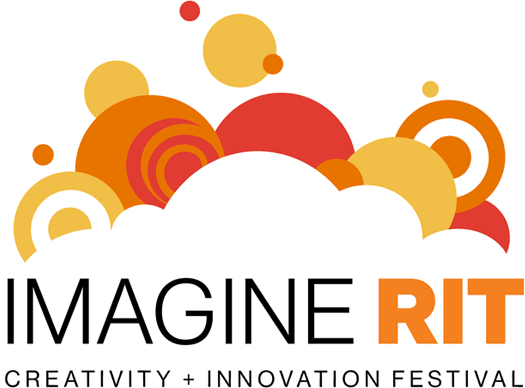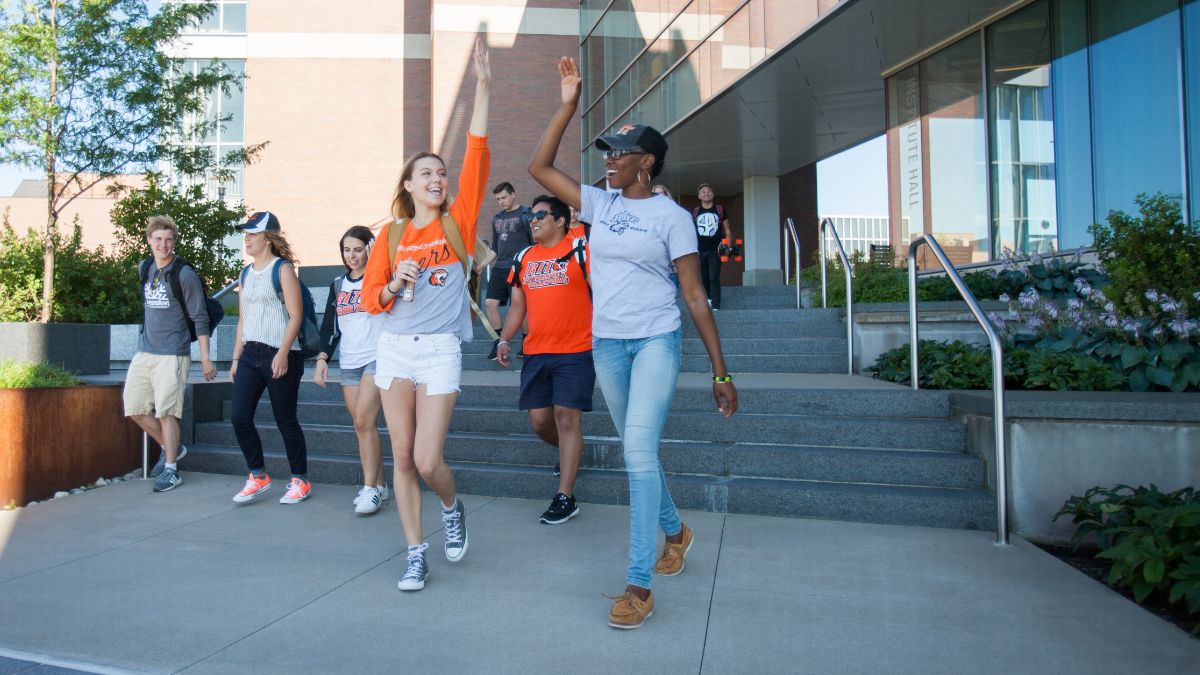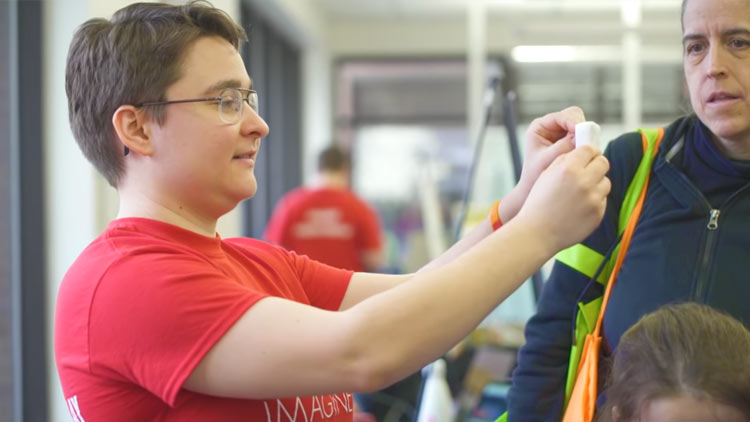Discover RIT
RIT is home to leading creators, entrepreneurs, innovators, and researchers. Founded in 1829, RIT is a private university with nine colleges emphasizing career education and experiential learning.
Rankings and Recognition
Don’t just take our word for it, our reputation as one of the world’s top universities is well documented.
50
RIT in Top 50 for High School Counselors
RIT is among the top 50 choices of high school counselors, according to U.S. News and World Report 2019 rankings.
3rd
Largest in STEM
RIT is the third largest producer of undergraduate STEM (science, technology, engineering, and math) degrees among all private universities in the nation.
95%
Outcome Rate
For each of the past three years, 95 percent of RIT graduates enter either the workforce or graduate study within six months of graduation.

Academic Leadership and Firsts
- 1960
- first female in the nation named to head a college of business, Edwina Hogadone appointed the dean of RIT’s College of Business.
- 1966
- chosen as the home campus for the federally sponsored National Technical Institute for the Deaf, which had been established in 1963 by Public Law 89-36 and signed by President Lyndon B. Johnson.
- 1982
- nation’s first microelectronics bachelor of science program specializing in the fabrication of semiconductor devices and integrated circuits
- 1983
- first university in the nation to offer a bachelor of science degree in biotechnology
- 1990
- nation’s first imaging science doctoral program
- 1991
- first fully online program—years before the rest of higher education entered the online arena
- 1993
- first nationally recognized information technology degree
- 1996
- first university to offer an undergraduate degree in software engineering
- 1998
- first engineering school in the nation is named after a woman when RIT designates the Kate Gleason College of Engineering
- 2002
- world’s first and only doctoral program in microsystems engineering
- 2008
- world’s first doctoral program focusing on sustainable production systems
- 2012
- among the first universities to create a department dedicated to computing security
- 2016
- one of the nation’s first universities to offer a bachelor of science degree in digital humanities and social science
A world leader in education and access for deaf and hard-of-hearing students.
RIT is home to the National Technical Institute for the Deaf (NTID), the world’s first and largest technological college for students who are deaf or hard of hearing. President Lyndon Johnson and Congress established NTID in 1968.


Learn more about NTID >
Research
It’s not enough to solve problems. Be a problem seeker.
RIT sponsored research grew by 18 percent in fiscal year 2018, reaching a record $78 million in funding. RIT received 340 new awards from a variety of state, federal, corporate, and foundation sponsors.
RIT’s strategic research initiatives are in the following areas: Cybersecurity, Personalized Healthcare Technology, the Future Photon Initiative, Remote Sensing with Unmanned Aerial Vehicles, and Computational Relativity and Gravitation.

Analyzing Biomedical Imagery: Nathan Cahill, standing, along with imaging science doctoral student Kfir Ben Zikri, is developing algorithms for a longitudinal study of lung nodules in CT scans.
Global
When you remake the world, the world tends to notice.
- International campuses in China, Croatia (the cities of Dubrovnik and Zagreb), Dubai, and Kosovo
- Partnerships with more than 60 nations, including Dominican Republic, Peru, and Sweden
- Global enrollment has more than doubled in the past 10 years, driven by explosive enrollment in the university’s graduate programs.
- A record 2,620 international students from more than 100 countries chose to study at RIT this academic year.


Alumni
- RIT alumni–135,000 strong–can be found in all 50 states and 123 countries.
- More than 50 percent of the university’s alumni have graduated since 1990; about a third of alumni have graduated since 2000.
- Notable alumni range from CEOs to Academy Award winners in film animation.
Eleven RIT alumni have won 15 Pulitzer Prizes in photojournalism.

Credit: David Carson ’94, St. Louis Post-Dispatch
A member of the St. Louis County Police tactical team fires tear gas into a crowd of people in response to a series of gunshots fired at police during demonstrations in Ferguson.

Credit: William Snyder ’81, The Dallas Morning News
U.S. diver Mary Ellen Clark dives to a surprise bronze medal in the 1992 Summer Olympic Games in Barcelona, Spain.

Credit: Dan Loh ’95, The Associated Press
Former White House intern Monica Lewinsky and her attorney William Ginsburg.
Experiential and Cooperative Education
Gold-plated careers forged from orange
RIT annually places more than 4,400 students in more than 6,200 co-op assignments with nearly 2,300 employers across the United States and overseas. In addition, experiential learning includes internships, research, and study abroad.



Sustainability
One of the world’s “greenest” universities, with two LEED platinum buildings and several gold. Home to the Golisano Institute for Sustainability (pictured below) and a massive 2-megawatt solar energy farm among the largest for any New York college.
Diversity
Leveraging Difference
RIT has long recognized the importance of diversity to organizational growth and synergy. The university has been recognized as a prestigious “Diversity Champion” by INSIGHT into Diversity magazine three consecutive years (2016, 2017, 2018). In addition, RIT is also a four-time recipient of the Higher Education Excellence in Diversity Award.
- RIT welcomed women decades before other colleges even considered co-education.
- The 1968 addition of the National Technical Institute for the Deaf brought intellectual, linguistic and programmatic diversity unmatched in higher education.
- In 2010, RIT began the Rochester City Scholars Program to ensure that finances would not be an obstacle for local students seeking a college education, and the first class graduated in 2014 (photo above).
- RIT and its Future Stewards Program were recognized in 2017 for the eighth time as one of the “Top 200 Colleges for Native Americans” in the annual special college issue of Winds of Change magazine.
- Expressions of King’s Legacy, one of the longest running programs in Rochester commemorating Dr. Martin Luther King, Jr., launched conversations on diversity and race relations that’s brought defining changes to the university and the community. The campus event marks its 35th year.

Diverse faculty and students are role models of success in STEM—science, technology, engineering and mathematics.


During Black History Month, students participate as part of the multicultural African Drum Ensemble with Liberal Arts faculty member Carl Atkins.
Athletics
RIT has 24 varsity sports—22 compete at Division III; men’s and women’s hockey at Division I.

Men’s hockey, elevated to Division I in 2005, reached the NCAA Frozen Four Championship in 2010.

In 2015, the men won the Atlantic Hockey Championship and advanced to the NCAA Tournament Elite 8.

Women’s hockey won the NCAA Division III title in 2012.

Men’s hockey won a Division II National Championship in 1983 and a Division III championship in 1985.

The 2014-15 women’s team won its second consecutive College Hockey America Championship, advancing to the NCAA Tournament for the first time as a Division I program since moving up in 2012.
For more information, visit our RIT Athletics website and Athletics Hall of Fame.

Each year, RIT demonstrates its leadership in creativity and innovation by sponsoring Imagine RIT, a campus-wide event that showcases the innovative and creative spirit of RIT students, faculty, and staff.


















